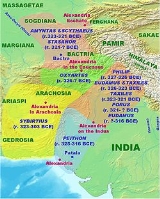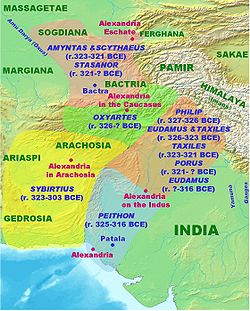
Stasanor
Encyclopedia
Stasanor was a native of Soli
in Cyprus
who held a distinguished position among the officers of Alexander the Great.
in 333 BC, but the first occasion on which his name is mentioned is during the campaign in Bactria
, when he was detached by Alexander with a strong force to reduce Arsames, the revolted satrap
of Aria. This service, in conjunction with Phrataphernes
, he successfully accomplished, and rejoined Alexander at Zariaspa in the autumn of 328 BC, bringing with him Arsames himself as a captive, as well as Barzanes, who had been appointed by Bessus
satrap of Parthia
.
 As a reward for this exploit he obtained the satrapy of Aria, which was, however, soon after changed for that of Drangiana
As a reward for this exploit he obtained the satrapy of Aria, which was, however, soon after changed for that of Drangiana
, in the command of which he remained during the whole of Alexander's campaign in India
. On the king's return, Stasanor was one of those who met him in Carmania with a very opportune supply of camels and other beasts of burden, but returned to resume the charge of his province when Alexander continued his march towards Persis. In the first partition of the provinces after the death of Alexander (323 BC), Stasanor retained his former satrapy of Drangiana, but in the subsequent division at Triparadisus (321 BC), he exchanged it for the more important government of Bactria and Sogdiana
.
Here he appears to have remained quiet for some years, taking no open part, so far as we are informed in the contest between Eumenes
and Antigonus
. After the victory of Antigonus, although Stasanor had apparently inclined in favour of Eumenes, Antigonus found it prudent to pardon him and left him in the undisturbed possession of his satrapy, 316 BC., since Stasanor had secured the attachment of the native population by the justice and moderation of his rule, and thus firmly established his power in the satrapy.
however explains that around 305 BCE Seleucus
attacked and conquered Bactria, probably in a conflict with Stasanor or possibly his successor:
(born in the same city of Soli, in Cyprus), a peripatetician philosopher who was seemingly involved in the foundation of the Bactrian city of Alexandria on the Oxus.
Soli, Cyprus
thumb|right|250px|Map showing the 10 ancient city Kingdoms of CyprusSoli or Soloi is an ancient Greek city in the island of Cyprus, located south-west of Morphou and on the coast in the gulf of Morphou and dates back to about the 6th century BC...
in Cyprus
Ancient history of Cyprus
The ancient history of Cyprus, also known as Classical Antiquity, dates from the 8th century BC to the Middle Ages. The earliest written records relating to Cyprus date to the Middle Bronze Age , see Alasiya.-Assyrian Period:...
who held a distinguished position among the officers of Alexander the Great.
Stasanor, officer of Alexander
He probably entered the service of that monarch after the conquest of CyprusCyprus
Cyprus , officially the Republic of Cyprus , is a Eurasian island country, member of the European Union, in the Eastern Mediterranean, east of Greece, south of Turkey, west of Syria and north of Egypt. It is the third largest island in the Mediterranean Sea.The earliest known human activity on the...
in 333 BC, but the first occasion on which his name is mentioned is during the campaign in Bactria
Bactria
Bactria and also appears in the Zend Avesta as Bukhdi. It is the ancient name of a historical region located between south of the Amu Darya and west of the Indus River...
, when he was detached by Alexander with a strong force to reduce Arsames, the revolted satrap
Satrap
Satrap was the name given to the governors of the provinces of the ancient Median and Achaemenid Empires and in several of their successors, such as the Sassanid Empire and the Hellenistic empires....
of Aria. This service, in conjunction with Phrataphernes
Phrataphernes
Phrataphernes was a Persian who held the government of Parthia and Hyrcania, under the king Darius III Codomannus, and joined that monarch with the contingents from the provinces subject to his rule, shortly before the battle of Gaugamela, 331 BC...
, he successfully accomplished, and rejoined Alexander at Zariaspa in the autumn of 328 BC, bringing with him Arsames himself as a captive, as well as Barzanes, who had been appointed by Bessus
Bessus
Artaxerxes V, also known as Bessus was a prominent Persian nobleman and satrap of Bactria, and later self-proclaimed king of Persia...
satrap of Parthia
Parthia
Parthia is a region of north-eastern Iran, best known for having been the political and cultural base of the Arsacid dynasty, rulers of the Parthian Empire....
.
Stasanor the Satrap

Drangiana
Drangiana or Zarangiana was a historical region of the Achaemenid Empire. This region comprises territory around lake Hâmûn, wetlands in endorheic Sīstān basin on the Irano-Afghan-Pakistan border, and its primary watershed Helmand river in nowadays southwestern Afghanistan and the "Nok Kondi" of...
, in the command of which he remained during the whole of Alexander's campaign in India
History of India
The history of India begins with evidence of human activity of Homo sapiens as long as 75,000 years ago, or with earlier hominids including Homo erectus from about 500,000 years ago. The Indus Valley Civilization, which spread and flourished in the northwestern part of the Indian subcontinent from...
. On the king's return, Stasanor was one of those who met him in Carmania with a very opportune supply of camels and other beasts of burden, but returned to resume the charge of his province when Alexander continued his march towards Persis. In the first partition of the provinces after the death of Alexander (323 BC), Stasanor retained his former satrapy of Drangiana, but in the subsequent division at Triparadisus (321 BC), he exchanged it for the more important government of Bactria and Sogdiana
Sogdiana
Sogdiana or Sogdia was the ancient civilization of an Iranian people and a province of the Achaemenid Empire, eighteenth in the list on the Behistun Inscription of Darius the Great . Sogdiana is "listed" as the second of the "good lands and countries" that Ahura Mazda created...
.
Here he appears to have remained quiet for some years, taking no open part, so far as we are informed in the contest between Eumenes
Eumenes
Eumenes of Cardia was a Thracian general and scholar. He participated in the wars of the Diadochi as a supporter of the Macedonian Argead royal house.-Career:...
and Antigonus
Antigonus I Monophthalmus
Antigonus I Monophthalmus , son of Philip from Elimeia, was a Macedonian nobleman, general, and satrap under Alexander the Great. During his early life he served under Philip II, and he was a major figure in the Wars of the Diadochi after Alexander's death, declaring himself king in 306 BC and...
. After the victory of Antigonus, although Stasanor had apparently inclined in favour of Eumenes, Antigonus found it prudent to pardon him and left him in the undisturbed possession of his satrapy, 316 BC., since Stasanor had secured the attachment of the native population by the justice and moderation of his rule, and thus firmly established his power in the satrapy.
Fate
From this time his name does not appear again in history. JustinJustin
Justin is a given name. It may refer to:People* Justin , a common given name* Justin , 3rd century Roman historian* Justin I , or Flavius Iustinius Augustus, an Eastern Roman Emperor who ruled from 518 to 527...
however explains that around 305 BCE Seleucus
Seleucus
-Monarchs and relations of the Seleucid Empire:* Seleucus I Nicator , son of Antiochus and founder of the Seleucid Empire* Seleucus II Callinicus * Seleucus III Ceraunus...
attacked and conquered Bactria, probably in a conflict with Stasanor or possibly his successor:
- "Seleucos made many wars in the Orient after the division of the Macedonian kingdom between allies. At the beginning, he took Babylon; from there, his strengths increased by victory, he took over the Bactrians. He then went to India, which, after the death of Alexander, had assassinated his prefects, as if shaking the burden of servitude" Justin XV.4
Connections
He was a contemporary and compatriot of Clearchus of SoliClearchus of Soli
Clearchus of Soli was a Greek philosopher of the 4th-3rd century BCE, belonging to Aristotle's Peripatetic school. He was born in Soli in Cyprus....
(born in the same city of Soli, in Cyprus), a peripatetician philosopher who was seemingly involved in the foundation of the Bactrian city of Alexandria on the Oxus.

